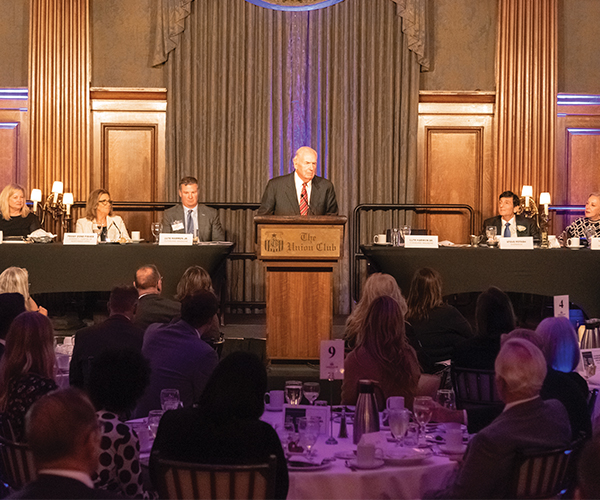Lee Fisher has always loved sports, although he claims he wasn’t good enough to play on a collegiate level. That didn’t stop the politician, lawyer, educator and economic wizard from excelling in intramural sports at Oberlin College in the 1970s.
“I once saw Lee throw a Frisbee years after his college time, and I told him he could have become a professional. It’s a team sport and a specialized skill, and he was great at it,” says Terry Coyne, a vice chairman in the Cleveland office of Newmark, a commercial real estate services firm.
“I took up the Frisbee with a lot of fervor,” recalls Fisher. “I loved how you could focus on where the Frisbee was going compared to where it was. There’s a certain excitement about being able to arrive before the Frisbee arrives. You had to chart where it was going — and do it quickly.”
That ability to see beyond a present situation and anticipate what is needed next has served Fisher well in all of his roles, including: lieutenant governor of Ohio (2007-2011); director, Ohio Department of Development (2007-2009); attorney general of Ohio (1991-1995); state senator (1983-1991); and state representative (1981-1983). The positions require, among other qualities, the superior guidance and management of massive budgets and extraordinary fundraising efforts. Fisher is now dean of Cleveland-Marshall College of Law at Cleveland State University.
“I am better known as an elected public official or a lawyer,” admits Fisher. “But I am equally proud of my time working with the Ohio and Cleveland business communities to attract, retain and grow businesses.”
When Fisher was president and CEO of the Center for Families and Children from 1999 to 2006 in Cleveland, he managed a $20 million budget and 300 team members. He led the development of a $4 million, three-year information technology plan and tripled the center’s revenue generation. Fisher also consolidated and moved the scattered offices of the organization to 4500 Euclid Ave. in MidTown, primarily so clients could have better access via public transportation.
“Without Lee, there would have been no MidTown Tech building,” claims Coyne, giving Fisher credit for the initial $21 million project developed by Geis Cos. and Coyne. “That was the first new investment in MidTown that wasn’t from Cleveland Clinic.”
Today, MidTown Tech Park Campus is a private/public collaboration of various partners that is considered a hub of the city’s business innovations.
Several other local companies that benefited from Fisher’s involvement and business guidance throughout the years include Eaton Corp., Alcoa Corp. and ViewRay, a cutting-edge medical device company in Oakwood Village. Fisher’s years at Hahn Loeser & Parks in Cleveland, where he was a lawyer from 1978 to 1990 and 1995 to 1999, gave him the opportunity to represent small and midsize businesses to navigate legislative and regulatory policies.
Fisher’s influence on the business community is not limited to Greater Cleveland. His negotiations have helped companies to remain in Ohio and often expand, including Goodyear Tire & Rubber Co. and Bridgestone (working together as TireHub) in Akron, NetJets in Columbus and Norwalk Furniture in Huron County. Also, one of the first state laws Fisher authored as a state senator was the Close Corporation Law that assisted closely held corporations and family businesses to better organize and succeed.
Fisher took on a different approach to the business community. According to Fisher, he started as the attorney general “when businesses were afraid the attorney general might come after them for either a consumer protection violation or an environmental protection violation.”
To lessen those concerns and not punish businesses unfairly, Fisher created an “early warning system” that allowed businesses to correct situations before they faced fines and other actions.
“We said, ‘If you do the following things to correct this, you can avoid litigation.’ We didn’t succeed all of the time, and sometimes we had to file legal action against them,” says Fisher. “But we significantly reduced the number of cases, and the attorney general’s office developed a stronger relationship with the business community.”
Fisher’s work as Ohio’s chief economic development officer included managing a $1 billion budget and a team of 400 and helping lead the creation of Ohio’s first Strategic Plan for Economic Development, which included Ohio’s Hubs of Innovation and Opportunity before Cleveland’s Innovation District.
Former Ohio Gov. Ted Strickland, in office from 2007 to 2011, says he and Fisher, then the state’s lieutenant governor, “were in office in the greatest recession since the Great Depression.”
“Lee was tenacious in his work ethic,” says Strickland. “I have never met anyone who was more committed to getting a job done. There were times when we would become aware of a particular company that was facing hardships or thinking of closing. Lee would get on it and work directly with them.
“There are people today who I believe would not be working at their current jobs if it wouldn’t have been for the work, intervention and advice that Lee was able to give them,” adds Strickland.
Coyne calls Fisher a “historic fundraiser” for civic projects, nonprofits and causes for which he cares. Others with deep pockets admit, often shaking their heads with humor, that when they see Fisher, they always hide their checkbooks.
“I can’t even imagine anyone who would be second best to Lee as a fundraiser,” says Coyne. “Whether he is running for governor or just trying to help an organization in which he is involved, he’s remarkable. He’s fearless.”
If Fisher has one regret in his long and varied career, it is not “actually running a business” that he either owned or served as the CEO. He insists he has always concentrated instead on investments in communities and people. That action, Fisher notes, is sometimes questioned in good nature by his longtime wife, president and CEO of the Diversity Center of Northeast Ohio, Peggy Zone Fisher, with whom he often shares philanthropic and social justice concerns and causes.
Fisher is not sure what kind of business he would have headed. But “it would have been a business that not only made a profit for shareholders, but also provided a benefit to society.” He points to his college classmate, Jerry Greenfield, the co-creator of Ben and Jerry’s ice cream, for having a wildly successful company that never lost its social responsibility.
Closer to home, Fisher also mentions OverDrive, a large global distributor of digital content for libraries and schools and its founder and CEO, Steve Potash, for making reading more accessible for everyone. The company’s headquarters is in Cleveland.
At 72, Fisher is still going strong, working and writing late into many a night.




